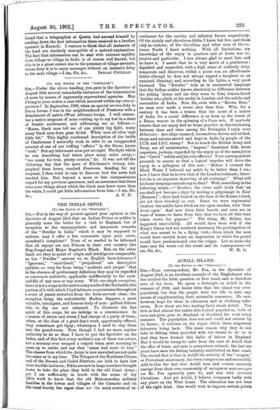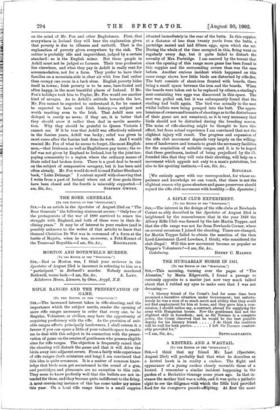ACHILL ISLAND.
(To THE EDITOR OF THE " SPECTATOR.")
SIB.,—Your correspondent, Mr. Fox, in the Spectator of August 23rd, is an excellent example of the Englishman who has studied the Irish question at first hand, and is therefore sure of his facts. He spent a fortnight on Achill in the summer of 1899, and learnt then that the island was over- populated, but that the people were too idle to take any means of supplementing their miserable resources. He saw, however, hope for them in education and in civilising influ- ences. Now there are two leading facts about Achill. The first is that almost the entire able-bodied population, both of men and girls, goes to England or Scotland for work every summer. The population does not and could not subsist by its farms; it subsists on the wages which these migratory labourers bring back. The main reason why they do not take to fishing when provided with the means to do so is that they have formed this habit of labour in England. But it would be wrong to infer from the case of Achill that the offer of boats and nets is everywhere refused ; the last ten years have seen the fishing industry established on that coast. The second fact is that in Achill the activity of the " souper," or Protestant missionary, has been conspicuous and successful. Add to this the fact that Achill men and women annually emerge from their own community of savages or semi-savages (as Mr. Fox agreeably puts it), and mix with civilised Christians. And yet Achill, I believe, compares badly with any place on the West Coast. The education has not been of the right kind. One would wish to impress certain points on the mind of Mr. Fox and other Englishmen. First, that everywhere in Ireland they will hear the explanation given that poverty is due to idleness and nnthrift. That is the explanation of poverty given everywhere by the rich. The cottier is probably idle and improvident, judged by a certain standard: so is the English miner. But these people in Achill must not be judged as farmers. Their true profession lies elsewhere, and what they pay in Achill is really rent for accommodation, not for a farm. They prefer to have their families on a mountain-side in clear air with free fuel rather than occupy one room in a back slum. English poverty hides itself in towns; Irish poverty is to be seen, bare-footed and often happy, in the most beautiful places of Ireland. If Mr. Fox's holidays took him to Poplar, Mr. Fox would see another kind of savages. As to Achill's attitude towards the law, Mr. Fox cannot be expected to understand it, for he cannot be expected to have read Irish history,—a subject not worth teaching even to the Irish. That Achill men are disloyal is surely no news; if they are, it is better that they should avow it rather than deal in servile aseenta- tion. Why they should be grateful to Queen Victoria I cannot see. If it be true that Achill was effectively relieved in .the famine years, Achill was lacky ; relief was given in most cases after the famine had done its work. And I would remind Mr. Fox of what he seems to forget, like most English- men,—that Irishmen as well as Englishmen pay taxes ; the re- lief was not given by England to Ireland, but by the joint tax- paying community to a region where the ordinary means of State relief had broken down. There is a good deal to be said on the subject of comparative savagery, but it has been said often already. Mr. Fox would do well to read Father Sheehan's book, " Luke Delmege." I content myself with observing that I write from a part of Ireland where out of four gaols three have been closed and the fourth is miserably supported.—I







































 Previous page
Previous page